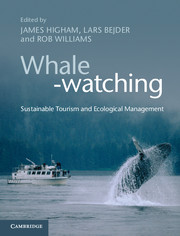Book contents
- Frontmatter
- Dedication
- Contents
- Acknowledgements
- List of contributors
- List of abbreviations
- 1 Tourism, cetaceans and sustainable development
- Part I The historical and contemporary contexts
- Part II Human dimensions of whale-watching
- Part III Ecological dimensions of whale-watching
- Part IV Sustainable management: insights and issues
- 18 The socioeconomic, educational and legal aspects of whale-watching
- 19 Vigilance, resilience and failures of science and management
- 20 Insights from agent-based modelling to simulate whale-watching tours
- 21 Cetacean-watching in developing countries
- 22 Kaikoura (New Zealand)
- 23 Management of dusky dolphin tourism at bKaikoura, New Zealand
- 24 Save the whales Part II
- 25 Time to rethink
- Index
- Plate Section
- References
21 - Cetacean-watching in developing countries
A case study from the Mekong River
from Part IV - Sustainable management: insights and issues
Published online by Cambridge University Press: 05 April 2014
- Frontmatter
- Dedication
- Contents
- Acknowledgements
- List of contributors
- List of abbreviations
- 1 Tourism, cetaceans and sustainable development
- Part I The historical and contemporary contexts
- Part II Human dimensions of whale-watching
- Part III Ecological dimensions of whale-watching
- Part IV Sustainable management: insights and issues
- 18 The socioeconomic, educational and legal aspects of whale-watching
- 19 Vigilance, resilience and failures of science and management
- 20 Insights from agent-based modelling to simulate whale-watching tours
- 21 Cetacean-watching in developing countries
- 22 Kaikoura (New Zealand)
- 23 Management of dusky dolphin tourism at bKaikoura, New Zealand
- 24 Save the whales Part II
- 25 Time to rethink
- Index
- Plate Section
- References
Summary
Introduction
Cetacean-watch tourism in developing countries remains poorly documented, and often poorly managed as a result of limited in-country capacity, ineffective governance, conflicting policy goals, and limited accountability. The dolphin-watch tourism that targets the population of Irrawaddy dolphins, Orcaella brevirostris, in the Mekong River in Cambodia and Laos is used as a case study to illustrate growing concerns associated with cetacean-watch tourism in developing countries. In the early 1990s, unregulated and unmanaged dolphin-watching tourism began in two of the most important habitats for this population, which now numbers less than 100 individuals. An Integrated Conservation Development Project, ‘Dolphins for Development’, was initiated in Kampi Village, Cambodia in 2004. This Project included an attempt to manage the existing dolphin-watch tourism through: (1) promoting the sharing of tourism revenue to the local community; (2) encouraging effective management of the industry to minimize threats to the dolphins; (3) promoting visitor satisfaction; and (4) raising community and visitor awareness of the status of the dolphins and the need for conservation. Although the initial results were encouraging, subsequent government intervention has resulted in: (1) a large increase in the number of boats operating in prime dolphin habitat and an increase in the harassment of dolphins; (2) reduction in the benefit to local communities; and (3) little or no information being provided to national or international tourists. Although management agencies are implementing significant conservation measures to reduce the threat to the dolphins from gillnet fishing by subsistence fishers, few efforts are being directed towards management of the dolphin-watch tourism industry. The urgent need to develop dolphin-watching tourism management initiatives in Cambodia was highlighted at the 2010 International Whaling Commission meeting, where a ‘no vessel-based’ dolphin tourism policy was recommended. A precautionary approach to management is needed to address the problem of unsustainable cetacean-watching currently occurring in numerous developing countries. This approach should be informed by location-specific and comprehensive studies on both the ecology of the dolphin–tourism interactions and the social, economic, managerial and political influences on cetacean-watch operations.
Information
- Type
- Chapter
- Information
- Whale-watchingSustainable Tourism and Ecological Management, pp. 307 - 322Publisher: Cambridge University PressPrint publication year: 2014
References
Accessibility standard: Unknown
Why this information is here
This section outlines the accessibility features of this content - including support for screen readers, full keyboard navigation and high-contrast display options. This may not be relevant for you.Accessibility Information
- 6
- Cited by
